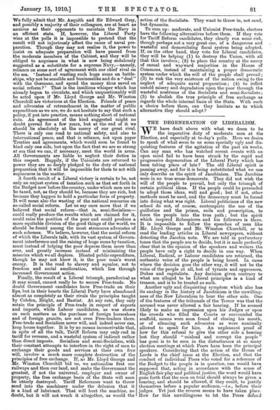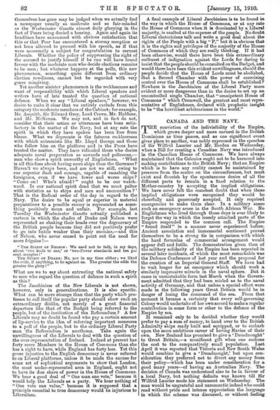THE DEGENERATION OF LIBERALISM W E have dealt above with what
we deem to be the imperative duty of moderate men at the Election, and especially at to-day's polls. Here we desire to speak of what seem to us some specially ugly and dis- quieting features of the agitation of the past six weeks. Can any man who has watched recent events with an open mind fail to have been struck by the rapid and progressive degeneration of the Liberal Party which has been taking place 'of late ? The old Liberal spirit is passing away, and for it is being substituted what we can only describe as the spirit of Jacobinism. The Jacobins were in no true sense democrats. They did not wish the will of the people to prevail, but only the triumph of certain political ideas. If the people could be persuaded to adopt those ideas, well and good ; but if not, other methods must be used, and the democracy must be forced into doing what was right. Liberal politicians of the new school do not, of course, contemplate the use of the guillotine and the prison, exile and proscription, to force the people into the true path ; but the spirit which inspired Robespierre and his followers is there. It is impossible to follow the speeches of men like Mr. Lloyd George and Mr. Winston Churchill, or to read the leading articles in Liberal newspapers, without detecting the ,Jacobin note. We are told in perfunctory tones that the people are to decide, but it is made perfectly clear that in the opinion of the speakers and writers the people have only a right to decide in one way. When Liberal, Radical, or Labour candidates are returned, the authentic voice of the people is being heard. In cases where the decision goes the other way, it will not be the voice of the people at all, but of tyrants and oppressors, Dukes and capitalists. Any decision given contrary to what are alleged to be Liberal principles is a kind of treason, and is to be treated as such.
Another ugly and disquieting symptom which also has its analogy in the history of Jacobinism is the unwilling- ness of the New Liberalism to hear the other side. One of the features of the tribunals of the Terror was that the accused was never allowed a fair hearing. If he seemed likely to make an impression upon his Judges or upon the crowds who filled the Courts or surrounded the scaffold, means were soon found of closing his mouth, or of silencing such advocates as were nominally allowed to speak for him. An unpleasant proof of how far this refusal to give the other side a hearing lest they should. " mislead and corrupt the people ' has gone is to be seen in the disturbances at so many election meetings at which Peers have been the principal speakers. Considering that the action of the House of Lords is the chief issue at the Election, and that the conduct of individual Peers who voted for a reference of the Budget to the people is in question, one would have supposed that, acting in accordance with the sense of English fair play and political justice, the word would have gone forth that the men on trial should always be given a hearing, and should be allowed, if they could, to justify themselves before a popular audience,--i.e., before their judges. -Yet just the reverse seems to have taken place. How far this unwillingness to let the Peers defend themselves has gone may be judged when we actually find a newspaper usually so moderate and so fair-minded as the Westminster Gazette almost daily glorying in the fact of Peers being denied a hearing. Again and again its headlines have announced with obvious satisfaction that this or that Peer has encountered a stormy reception or not been allowed to proceed with his speech, as if that were necessarily a subject for congratulation to earnest Liberals. Whether the policy of suppressing the right of the accused to justify himself if he can will have found favour with the moderate men who decide elections remains to be seen ; but whatever happens at the polls, this new phenomenon, something quite different from ordinary election rowdiness, cannot but be regarded with very grave misgiving. Yet another sinister phenomenon is the recklessness and want of responsibility with which Liberal speakers and writers have of late treated the question of national defence. When we say " Liberal speakers," however, we desire to make it clear that we entirely exclude from this category the moderate members of the Cabinet; for example, Mr. Asquith, Sir Edward Grey, Lord Crewe, Mr. Haldane, and Mr. McKenna. We may not, and in fact do not, consider that their action or utterances have been satis- factory in the matter of the Navy, but at any rate the spirit in which they have spoken has been free from blame. What we deprecate is the fatuous recklessness with which extremists like Mr. Lloyd George and those who follow him on the platform and in the Press have treated the matter. They have ridiculed those who desire adequate naval preparation as cowards and poltroons,— men who show a spirit unworthy of Englishmen. What is all this fuss about having more ships than the Germans ? Haven't we always been, and are not we still, owing to our superior dash and courage, capable of smashing the foreigners, even if we have fewer and worse ships ? " Come on I Who's afraid ? " ought to be our -watch- word. Is our national spirit dead that we must palter with statistics as to ships and men and ammunition ? ' That is the Radical order of the day in regard to the Navy. The desire to be equal or superior in material preparations to a possible enemy is represented as some- thing positively mean and unfair. For example, last Tuesday the Westminster Gazette actually published a cartoon in which the shades of Drake and Nelson were represented as shaking their heads over the degeneracy of the British people because they did not positively prefer to go into battle weaker than their enemies,--and this of Nelson, who never ceased to point out the need for more frigates Tun SPIRIT OF NRIXON : We used not to talk, in my days, about 'two keels to one,' or 'two-Power standards and ten per cent. margins !' Tine Smarr or DRAKE • No, nor in my time either ; we liked the odds, if anything, to be against us. The greater the odds the greater the glory!
What are we to say about entrusting the national safety to men who regard the question of defence in such a spirit as this ?
The 3acobinism of the New Liberals is not shown, however, only in generalisations. It is also specific. What can be more strange than that the party which pro- fesses to call itself the popular party should show such an extraordinary dislike, not merely of a great financial departure like that of the Budget being referred to the people, but of the institution of the Referendum ? A few Liberals may no doubt be found who pay a certain amount of lip-service to the idea of referring important measures to a poll of the people, but to the ordinary Liberal Party man the Referendum is anathema. Take again the unwillingness of the Liberals to deal with the question of the over-representation of Ireland. Ireland at present has forty more Members in the House of Commons than she has a right to have, while England has forty less. Yet this gross injustice to the English democracy is never referred to on Liberal platforms, unless it be made the excuse for some set of sophistical arguments to show that London, the most under-represented area in England, ought not to have its due share of power in the House of Commons. We hear a good deal of " One man one vote," because it would help the Liberals ae a party.We hear nothing of " One vote one value," because it is supposed that a principle essential to true democracy would be injurious to Liberalism. A final example of Liberal daoobinis' m is to be found in the way in which the House of Commons, or at any rate the House of Commons when it is dominated by a Liberal majority, is exalted at the expense of the people. Pro doubt Liberal rhetoricians talk and write a good deal about the rights of the People with a big " P," but it is obvious that it is the rights and privileges of the majority of the House of Commons of which they are really thinking If it had been otherwise, would there have been this extraordinary outburst of indignation against the Lords for daring to insist that the people should be consulted on the Budget, and would there have been this evident unwillingness, should the people decide that the House of Lords must be abolished, that a Second Chamber with the power of exercising control over the House of Commons shall be established ? Nowhere is the Jacohinism of the Liberal Party more evident or more dangerous than in the desire to set up an uncontrolled single Chamber, that " omnipotent House of Commons " which Cromwell, the greatest and most repre- sentative of Englishmen, declared with prophetic insight to be " the horriblest arbitrariness in the world."







































 Previous page
Previous page